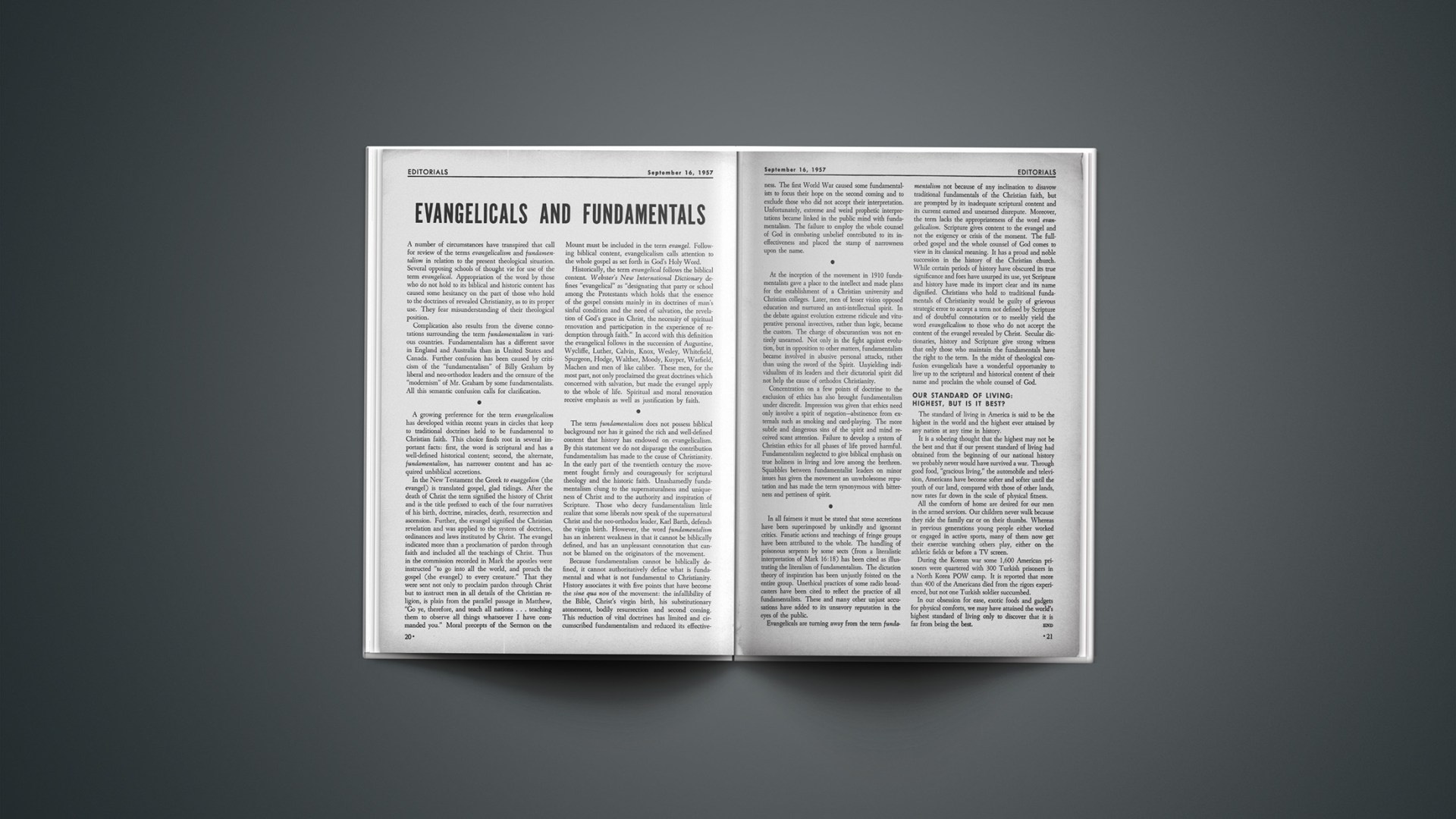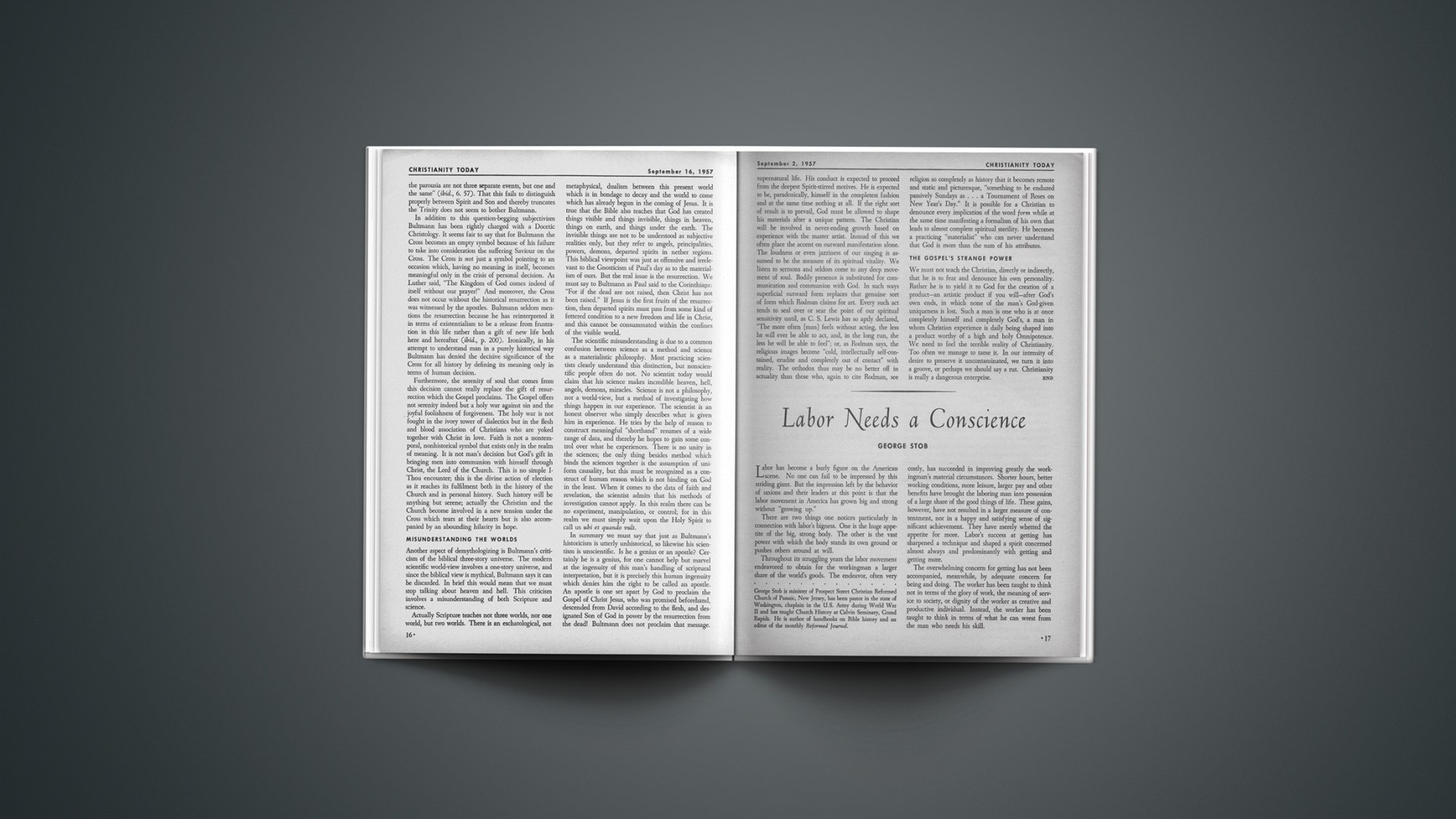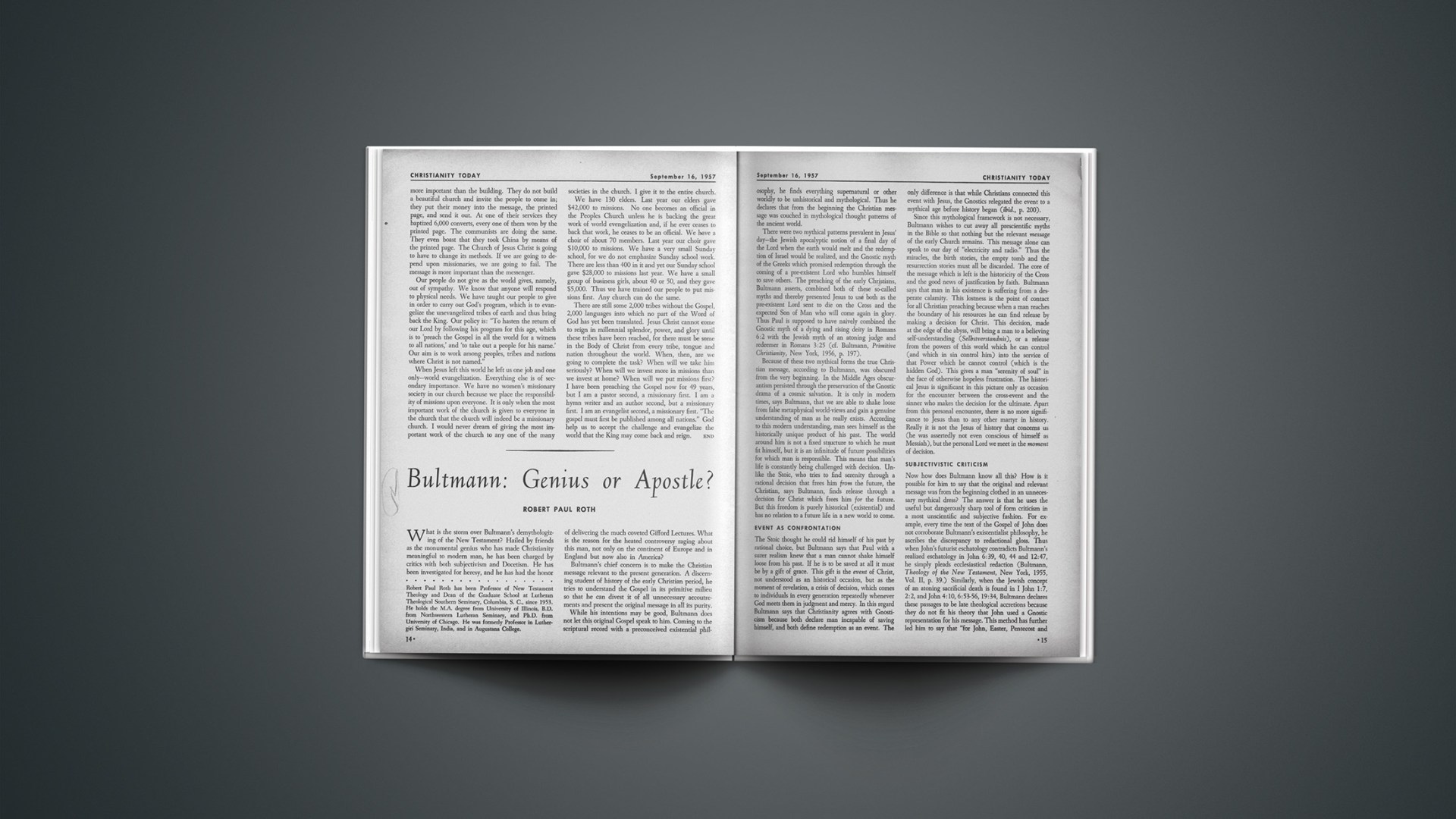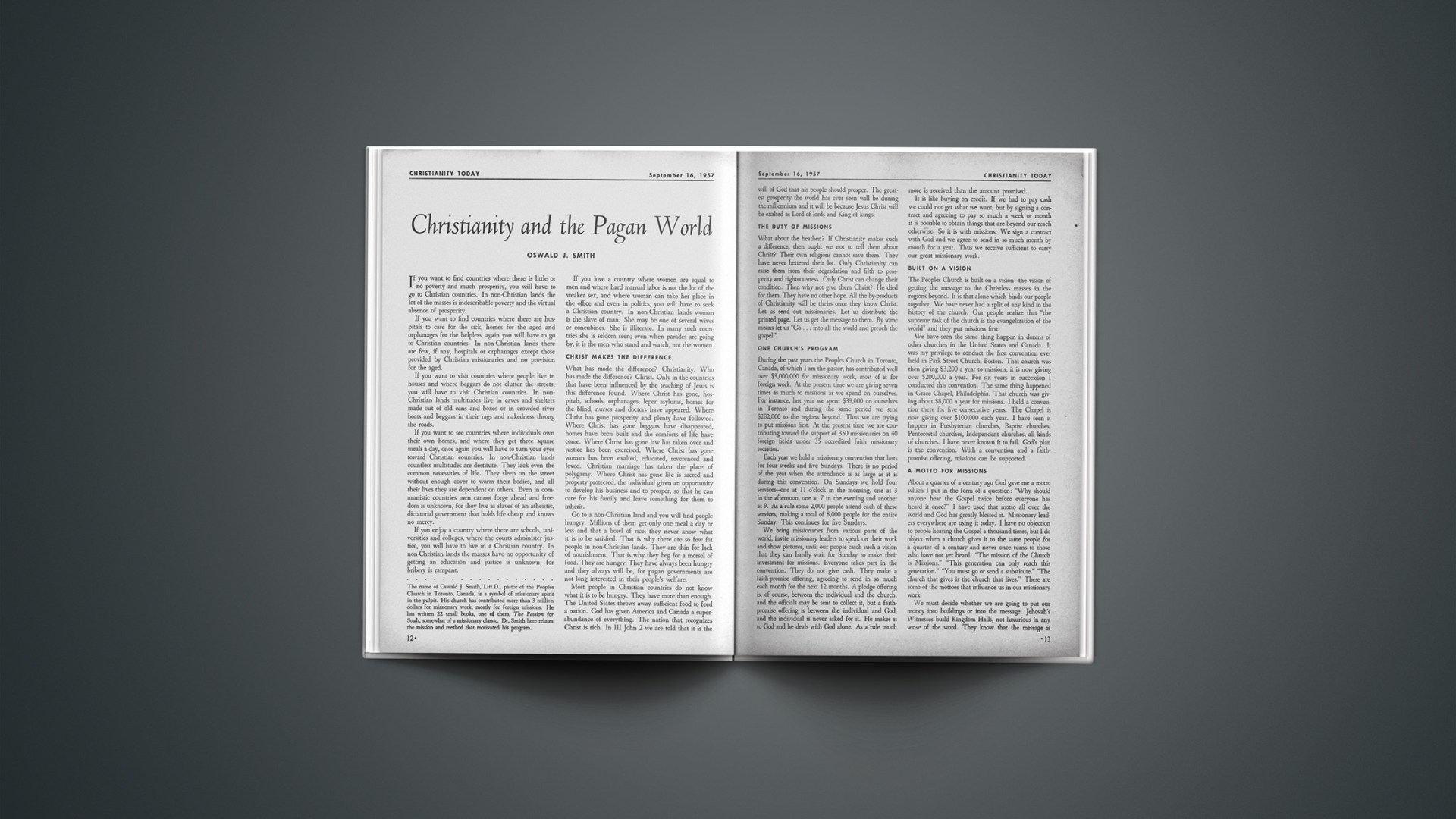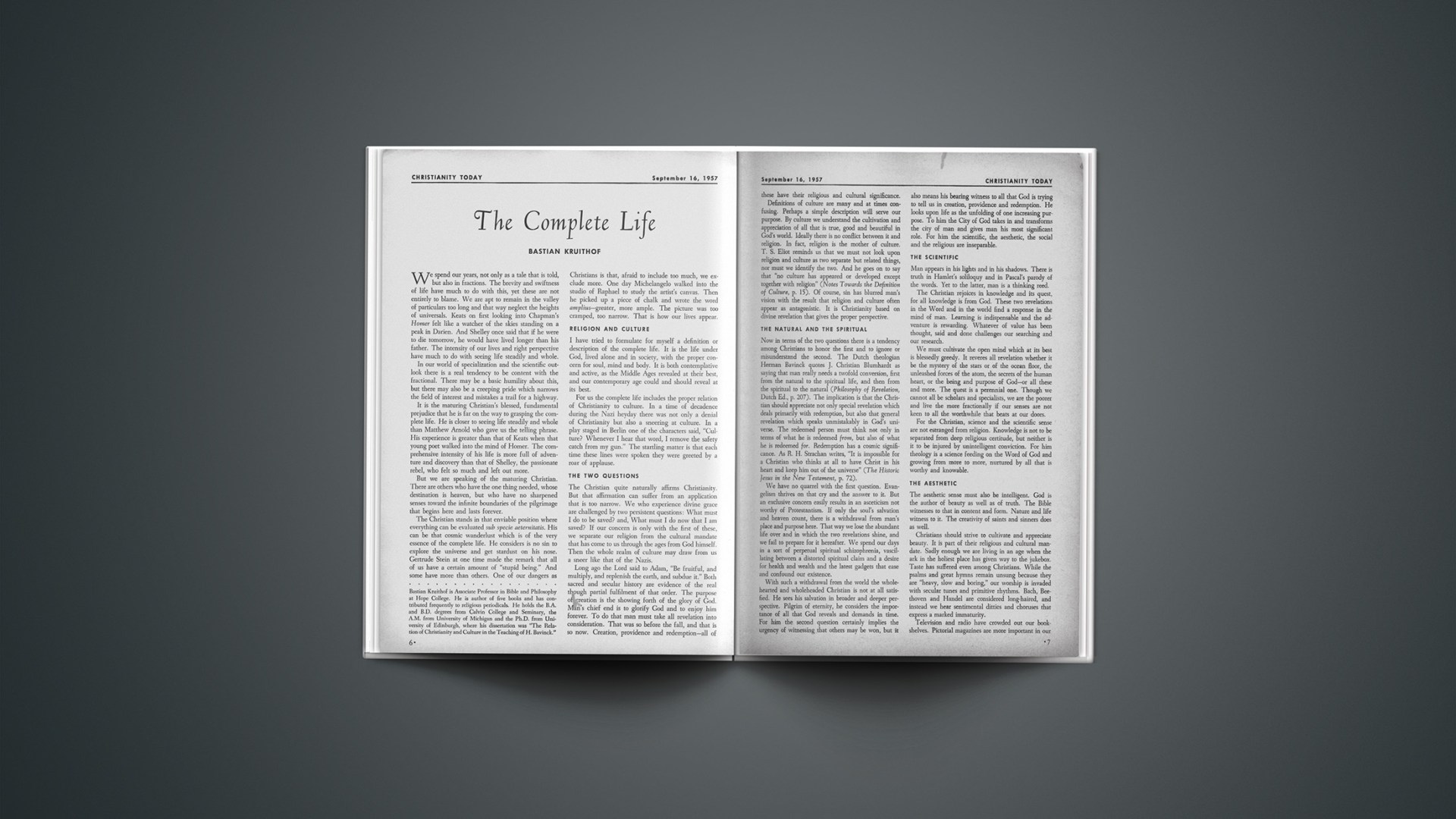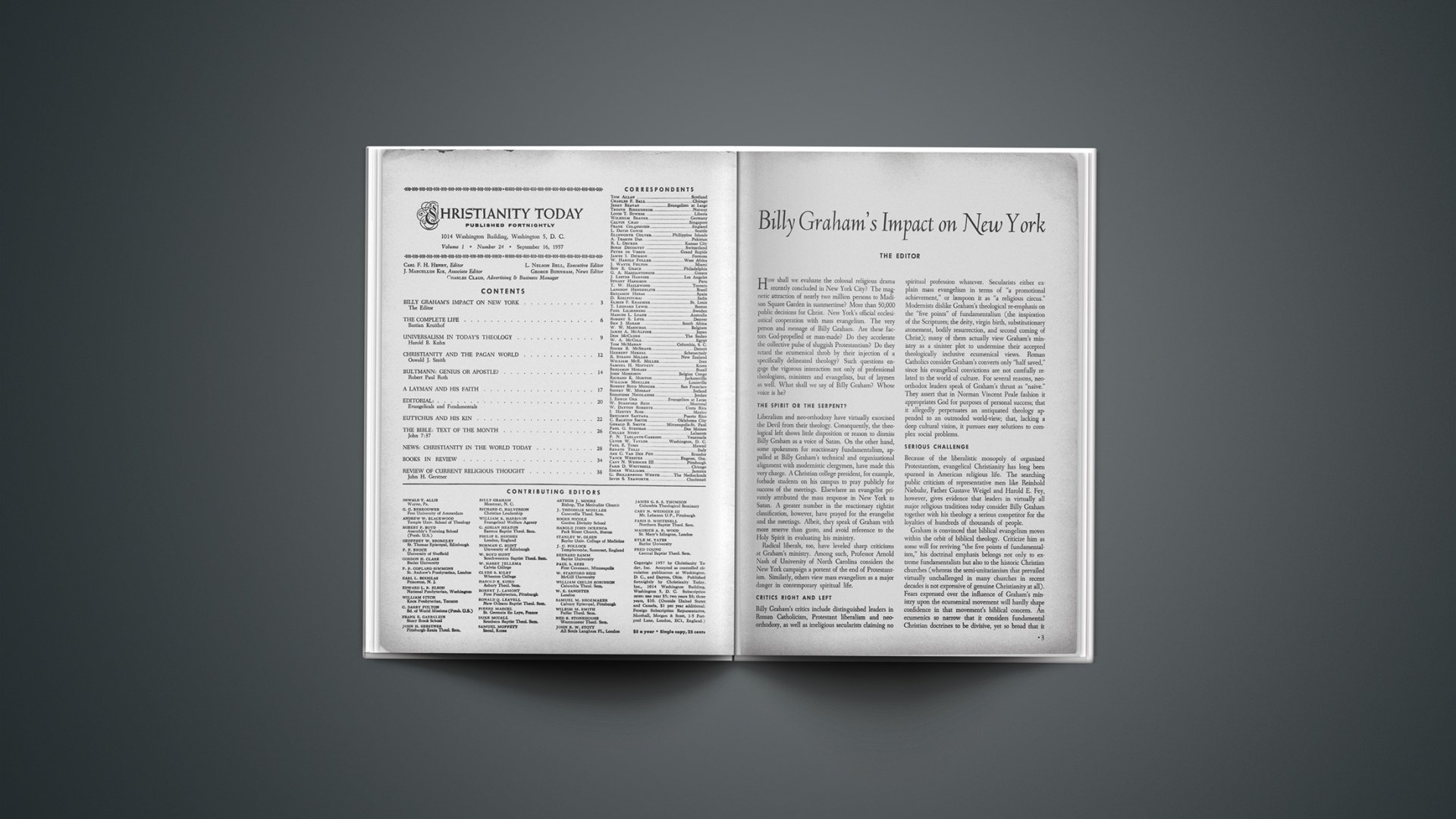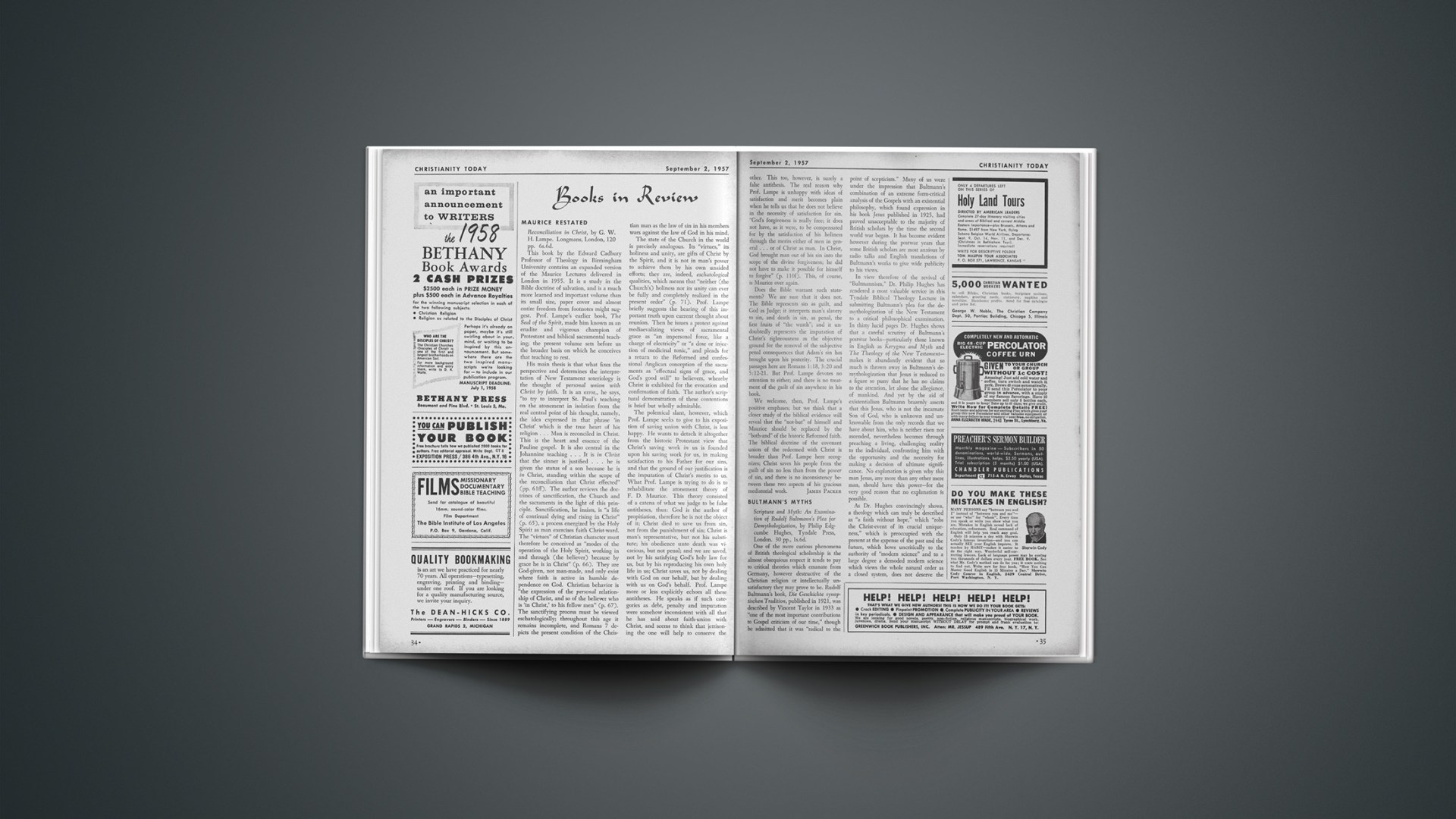A number of circumstances have transpired that call for review of the terms evangelicalism and fundamentalism in relation to the present theological situation. Several opposing schools of thought vie for use of the term evangelical. Appropriation of the word by those who do not hold to its biblical and historic content has caused some hesitancy on the part of those who hold to the doctrines of revealed Christianity, as to its proper use. They fear misunderstanding of their theological position.
Complication also results from the diverse connotations surrounding the term fundamentalism in various countries. Fundamentalism has a different savor in England and Australia than in United States and Canada. Further confusion has been caused by criticism of the “fundamentalism” of Billy Graham by liberal and neo-orthodox leaders and the censure of the “modernism” of Mr. Graham by some fundamentalists. All this semantic confusion calls for clarification.
•
A growing preference for the term evangelicalism has developed within recent years in circles that keep to traditional doctrines held to be fundamental to Christian faith. This choice finds root in several important facts: first, the word is scriptural and has a well-defined historical content; second, the alternate, fundamentalism, has narrower content and has acquired unbiblical accretions.
In the New Testament the Greek to euaggelion (the evangel) is translated gospel, glad tidings. After the death of Christ the term signified the history of Christ and is the title prefixed to each of the four narratives of his birth, doctrine, miracles, death, resurrection and ascension. Further, the evangel signified the Christian revelation and was applied to the system of doctrines, ordinances and laws instituted by Christ. The evangel indicated more than a proclamation of pardon through faith and included all the teachings of Christ. Thus in the commission recorded in Mark the apostles were instructed “to go into all the world, and preach the gospel (the evangel) to every creature.” That they were sent not only to proclaim pardon through Christ but to instruct men in all details of the Christian religion, is plain from the parallel passage in Matthew, “Go ye, therefore, and teach all nations … teaching them to observe all things whatsoever I have commanded you.” Moral precepts of the Sermon on the Mount must be included in the term evangel. Following biblical content, evangelicalism calls attention to the whole gospel as set forth in God’s Holy Word.
Historically, the term evangelical follows the biblical content. Webster’s New International Dictionary defines “evangelical” as “designating that party or school among the Protestants which holds that the essence of the gospel consists mainly in its doctrines of man’s sinful condition and the need of salvation, the revelation of God’s grace in Christ, the necessity of spiritual renovation and participation in the experience of redemption through faith.” In accord with this definition the evangelical follows in the succession of Augustine, Wycliffe, Luther, Calvin, Knox, Wesley, Whitefield, Spurgeon, Hodge, Walther, Moody, Kuyper, Warfield, Machen and men of like caliber. These men, for the most part, not only proclaimed the great doctrines which concerned with salvation, but made the evangel apply to the whole of life. Spiritual and moral renovation receive emphasis as well as justification by faith.
•
The term fundamentalism does not possess biblical background nor has it gained the rich and well-defined content that history has endowed on evangelicalism. By this statement we do not disparage the contribution fundamentalism has made to the cause of Christianity. In the early part of the twentieth century the movement fought firmly and courageously for scriptural theology and the historic faith. Unashamedly fundamentalism clung to the supernaturalness and uniqueness of Christ and to the authority and inspiration of Scripture. Those who decry fundamentalism little realize that some liberals now speak of the supernatural Christ and the neo-orthodox leader, Karl Barth, defends the virgin birth. However, the word fundamentalism has an inherent weakness in that it cannot be biblically defined, and has an unpleasant connotation that cannot be blamed on the originators of the movement.
Because fundamentalism cannot be biblically defined, it cannot authoritatively define what is fundamental and what is not fundamental to Christianity. History associates it with five points that have become the sine qua non of the movement: the infallibility of the Bible, Christ’s virgin birth, his substitutionary atonement, bodily resurrection and second coming. This reduction of vital doctrines has limited and circumscribed fundamentalism and reduced its effectiveness. The first World War caused some fundamentalists to focus their hope on the second coming and to exclude those who did not accept their interpretation. Unfortunately, extreme and weird prophetic interpretations became linked in the public mind with fundamentalism. The failure to employ the whole counsel of God in combating unbelief contributed to its ineffectiveness and placed the stamp of narrowness upon the name.
•
At the inception of the movement in 1910 fundamentalists gave a place to the intellect and made plans for the establishment of a Christian university and Christian colleges. Later, men of lesser vision opposed education and nurtured an anti-intellectual spirit. In the debate against evolution extreme ridicule and vituperative personal invectives, rather than logic, became the custom. The charge of obscurantism was not entirely unearned. Not only in the fight against evolution, but in opposition to other matters, fundamentalists became involved in abusive personal attacks, rather than using the sword of the Spirit. Unyielding individualism of its leaders and their dictatorial spirit did not help the cause of orthodox Christianity.
Concentration on a few points of doctrine to the exclusion of ethics has also brought fundamentalism under discredit. Impression was given that ethics need only involve a spirit of negation—abstinence from externals such as smoking and card-playing. The more subtle and dangerous sins of the spirit and mind received scant attention. Failure to develop a system of Christian ethics for all phases of life proved harmful. Fundamentalism neglected to give biblical emphasis on true holiness in living and love among the brethren. Squabbles between fundamentalist leaders on minor issues has given the movement an unwholesome reputation and has made the term synonymous with bitterness and pettiness of spirit.
•
In all fairness it must be stated that some accretions have been superimposed by unkindly and ignorant critics. Fanatic actions and teachings of fringe groups have been attributed to the whole. The handling of poisonous serpents by some sects (from a literalistic interpretation of Mark 16:18) has been cited as illustrating the literalism of fundamentalism. The dictation theory of inspiration has been unjustly foisted on the entire group. Unethical practices of some radio broadcasters have been cited to reflect the practice of all fundamentalists. These and many other unjust accusations have added to its unsavory reputation in the eyes of the public.
Evangelicals are turning away from the term fundamentalism not because of any inclination to disavow traditional fundamentals of the Christian faith, but are prompted by its inadequate scriptural content and its current earned and unearned disrepute. Moreover, the term lacks the appropriateness of the word evangelicalism. Scripture gives content to the evangel and not the exigency or crisis of the moment. The full-orbed gospel and the whole counsel of God comes to view in its classical meaning. It has a proud and noble succession in the history of the Christian church. While certain periods of history have obscured its true significance and foes have usurped its use, yet Scripture and history have made its import clear and its name dignified. Christians who hold to traditional fundamentals of Christianity would be guilty of grievous strategic error to accept a term not defined by Scripture and of doubtful connotation or to meekly yield the word evangelicalism to those who do not accept the content of the evangel revealed by Christ. Secular dictionaries, history and Scripture give strong witness that only those who maintain the fundamentals have the right to the term. In the midst of theological confusion evangelicals have a wonderful opportunity to live up to the scriptural and historical content of their name and proclaim the whole counsel of God.
Our Standard Of Living: Highest, But Is It Best?
The standard of living in America is said to be the highest in the world and the highest ever attained by any nation at any time in history.
It is a sobering thought that the highest may not be the best and that if our present standard of living had obtained from the beginning of our national history we probably never would have survived a war. Through good food, “gracious living,” the automobile and television, Americans have become softer and softer until the youth of our land, compared with those of other lands, now rates far down in the scale of physical fitness.
All the comforts of home are desired for our men in the armed services. Our children never walk because they ride the family car or on their thumbs. Whereas in previous generations young people either worked or engaged in active sports, many of them now get their exercise watching others play, either on the athletic fields or before a TV screen.
During the Korean war some 1,600 American prisoners were quartered with 300 Turkish prisoners in a North Korea POW camp. It is reported that more than 400 of the Americans died from the rigors experienced, but not one Turkish soldier succumbed.
In our obsession for ease, exotic foods and gadgets for physical comforts, we may have attained the world’s highest standard of living only to discover that it is far from being the best.
END

